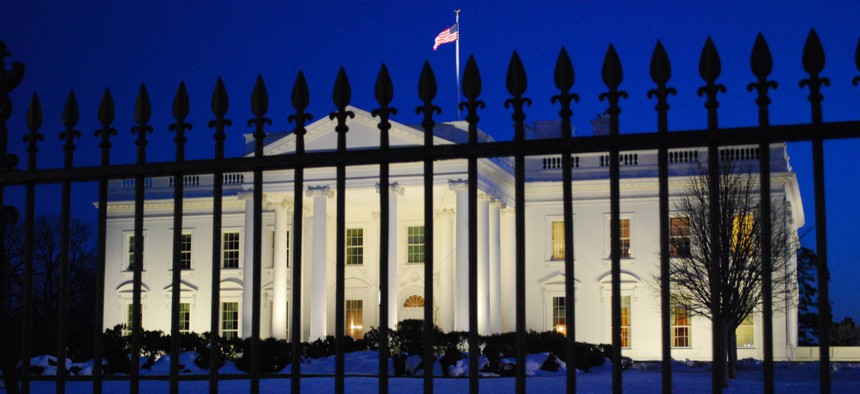Other candidates have used NDAs, of course, including Hillary Clinton. But Trump’s campaign was unusual in that it required everyone, paid or unpaid, staffer or volunteer, to sign one. And the agreement was shockingly broad, basically prohibiting any criticism (or “disparagement,” as the contract puts it) of Trump, any Trump family member, and any entity, partnership, trust, or organization that, in whole or in part, was created by or for the benefit of Trump.

alejandraguillen / Shutterstock.com
President Trump’s secrecy habit is extreme and extremely troubling. His main concern, it seems, is to prevent leaks that may embarrass him or his family.
A new complaint before the American Arbitration Association reveals that the 2016 Trump campaign’s nondisclosure agreement (NDA) defined as confidential any information that “Mr. Trump insists remain private or confidential.” The gag on embarrassing Trump lasted not only “during the term of your service” but also “at all times thereafter.” Trump has taken his draconian contractual clauses with him to Washington. The White House staff NDA appears to impose penalties for any unauthorized revelation of confidential information, defined as “all nonpublic information I learn of or gain access to in the course of my official duties.” Such language is unprecedented—to use a word that’s getting a workout these days.
Other presidents have demanded discretion, too. Since the 1980s, presidents have required key staff to sign a form that mandates protection of information marked as classified. But, again, Trump’s NDAs push the envelope far beyond national security and sensitive policy details to all “nonpublic information.”
How did we get here?
NDAs became common in private industry in the 1970s with the rise of tech companies that sought to protect trade secrets, such as algorithms, product design, and inventions. This kind of protection makes sense. Let’s say a pharmaceutical company is conducting groundbreaking research that could lead to an exclusive new drug. If an employee leaked this secret information, that would cause significant financial harm to the company. NDAs for trade secrets—like other protections for intellectual property—encourage investment in research and development, and allow firms to share confidential information internally without risk of unfair competition by an insider.
Since the 1980s, NDAs have expanded beyond these legitimate goals. More and more employees are asked to sign them—studies shows that over a third of the U.S. workforce is bound by restrictive covenants—and they cover more and more categories of information and activity. Private companies regularly require their employees to sign contracts that prohibit disclosure of any information that may hurt the company, including misconduct and unethical behavior. As the public has come to learn with the advent of #MeToo, confidentiality clauses are also standard practice in settlements with an employee who is the victim of sexual harassment or discrimination. Rose McGowan and other women spoke up against the now-disgraced producer Harvey Weinstein despite their belief that their silence contracts might expose them to legal liability.
Ultimately, thanks in part to the publicity of the #MeToo campaign, McGowan and others were not sued by Weinstein. And despite their prevalence, the law includes many limits not only to the enforceability of NDAs but also to their use. The courts have been consistent in maintaining that NDAs cannot prevent an employee from reporting illegal conduct and aiding agency investigations. The National Labor Relations Board holds that non-disparagement clauses, as well as clauses that attempt to prevent employees from discussing with their coworkers the terms and conditions of their jobs, conflict with the rights of workers to engage in concerted activity. The courts have invalidated agreements that prohibit employees from filing charges about harassment and discrimination. The federal Defend Trade Secrets Act (DTSA) includes a whistleblower immunity clause and the law requires that every new NDA since the law was passed in 2016 include a paragraph alerting employees to their whistleblowing rights. Several states and federal bills seek to limit NDAs in harassment settlements.
White House employees are protected by this thick statutory web—and by the Constitution. Government employees are allowed to speak about matters of public concern, and their First Amendment rights can only be offset by legitimate interests which do not include covering up illegality or fear of embarrassment. In 1980, the Supreme Court held that a former CIA agent breached his confidentiality when he published a book that caused "irreparable harm" to national security. Perhaps emboldened by that precedent, Trump has threatened to file lawsuits against the former White House staffers Cliff Sims and Omarosa Manigault Newman, who both wrote tell-all books about their experiences. But I would venture that no court today would find a breach of confidentiality when the topic of a book is the president’s morals and behavior.
If Trump believes he can enforce his nondisclosures agreements against former White House or campaign employees who speak about the improprieties they witnessed, then he is wrong: His broad NDAs are unenforceable under contract law, under whistleblowing and antiretaliation protections, under freedom of information laws, and under constitutional law. When it comes to the president of the United States, the public interest in access to the information surely outweighs any interest in contract enforcement.
But if Trump believes he can weaponize NDAs to conceal misconduct, he is right. It’s the effect of a contract that counts, not its legality. The prolific use of NDAs risks setting a terrible new standard of silence and fear.






